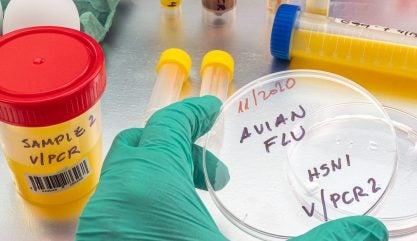
A Cal-Maine Foods egg facility in Texas has ceased production temporarily following the detection of avian influenza.
The site in Parmer County has “tested positive for highly pathogenic avian influenza (HPAI)”, Cal-Maine said in a statement yesterday (2 April).

Discover B2B Marketing That Performs
Combine business intelligence and editorial excellence to reach engaged professionals across 36 leading media platforms.
The test had resulted “in [the] depopulation of approximately 1.6 million laying hens and 337,000 pullets, or approximately 3.6% of the company’s total flock as of 2 March”.
Mississippi-headquartered Cal-Maine said it will seek to bolster its egg production at other sites as the business engages with federal, state and local government authorities “to mitigate the risk of future outbreaks and effectively manage the response”.
In a separate third-quarter results announcement yesterday, Cal-Maine identified another of its plants that had been hit with HPAI during the three months to 2 March.
An outbreak was discovered at the company’s facility in Kansas, resulting in the depopulation of about 1.5m laying hens and 240,000 pullets. The Parmer County site then tested positive on 1 April, Cal-Maine said.

US Tariffs are shifting - will you react or anticipate?
Don’t let policy changes catch you off guard. Stay proactive with real-time data and expert analysis.
By GlobalDataThe impact of HPAI was evident in the company’s third-quarter sales and net income as the H5NI virus pushed up egg prices in the year-earlier period.
Sales fell 30% to $703.1m as prices came off those highs and they were down 32% for the year so far at $1.68bn.
Sherman Miller, Cal-Maine’s president and CEO, said: “Our sales reflect lower average selling prices compared to a year ago, when the shell egg industry experienced record-high market prices due primarily to the impact of HPAI and other market factors resulting in a significant reduction in supply.
“While the more recent outbreaks of HPAI have also affected supply and caused market prices to move higher, the overall market impact has not been as severe.”
Cal-Maine’s volumes rose in the third quarter in terms of dozens of eggs sold, increasing to 300.8m from 291.4m a year earlier. The net average selling price dropped to $2.25 a dozen from $3.30.
Max Bowman, vice president and CFO, said risks remain to egg prices from feed costs.
“Current indications for corn supply project an overall better stocks-to-use ratio, implying potentially lower prices in the near term,” Bowman added.
“However, as we continue to face uncertain external forces including weather patterns and global supply chain disruptions, price volatility could remain. Soybean meal supply has remained tight relative to demand in the third quarter of fiscal 2024.”
Citing findings from the US Centers for Disease Control and Prevention, Cal-Maine said the risk to humans from HPAI “is considered to be low”.
It added: “There is no known risk related to HPAI associated with eggs that are currently in the market and no eggs have been recalled.”
Elsewhere in the results, Cal-Maine’s group operating income slid 60% to $162.8m in the third quarter and was down 79% year to date at $170.2m.
Net income fell 55% to $146.4m for the quarter and declined 74% for the year so far to $163.3m.
Miller said: “We are proud of our ability to manage our operations effectively and deliver favourable results to date for fiscal 2024. Like other producers, we have navigated significant challenges related to HPAI, and we remain diligent in our efforts to mitigate any future risks.”





